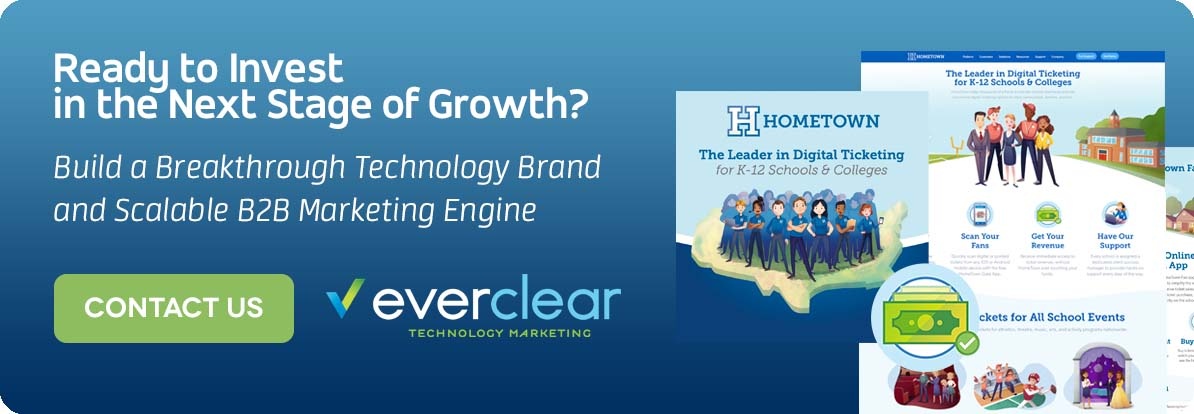
Your tech company has finally achieved product market fit, increased customer traction and recently raised funding to further accelerate growth. As the CEO, head of sales or newly hired VP of Marketing, you're ready to expand your sales and marketing efforts, but trying to decide how best to build a scalable foundation for growth.
Instead of reinventing the wheel, follow our proven marketing playbook and repeatable marketing process to develop and execute a high-growth marketing strategy, maximize the impact of your new marketing budget and make the most of recent funding to build a scalable foundation for growth.
- Research the industry for customer and competitor insights
- Plan and revisit your marketing strategy and objectives
- Define and differentiate your positioning and brand
- Create content that educates your prospects
- Execute an efficient and effective go-to-market launch
- Measure the return on your marketing investment
1. Research the Industry for Customer and Competitor Insights
Now that your company is ready to expand its sales and marketing efforts, it’s time to create, refine or revisit your marketing plan. But gathering additional research first can prevent costly communication mistakes, tactical misfires or poorly-aligned spending allocations.
Spend Quality Time With Sales
No one in your organization knows more about your customers than those in the field. By aligning your efforts with sales early on, you’ll learn which messages are most effective, understand which materials are missing and determine which activities generate the most qualified leads in order to establish your short-term sales goals and balance your long-term marketing objectives.
Reach Out to Product Development
Include your engineers and product developers in your research activities to gain a valuable perspective on important technical details and intellectual property patents. Their technology background, product knowledge and domain expertise can help you understand the significance of key features and benefits and form the basis of your company’s unique differentiators and overall competitive advantage.
Understand the Needs of your Customers
Many technology companies spend too much time focusing on the products they are selling instead of identifying what their customers are most interested in buying. Avoid this disconnect by reaching out to your best customers — as well as lost prospects — to develop a deeper understanding of why your company won the deal or what could have been done to improve the sales experience.
Keep Tabs on the Competition
Know what your competition is doing online, what kind of content they are producing, where they are generating media coverage, etc. By combining this knowledge with your customer insight, you can address significant threats, exploit potential vulnerabilities and identify positioning opportunities to successfully differentiate your company, products and marketing efforts.
Read Up on your Industry
Research web sites, blogs, trade publications and industry analysts that cover your industry and identify specific reporters, bloggers and social media influencers. Set up Google Alerts for your company, competitors and keywords and monitor social media to see what topics are being written about and which hashtags are being discussed in order to recognize new trends and uncover opportunities for greater market traction.
"Calling your best customers to dig in and really understand what you could do that no one else does is essential for creating a marketing strategy and message that has impact."
John Jantch, Author of “Duct Tape Marketing”
Market research is more than a one-time activity. It's important to build regular feedback and ongoing insight into your marketing process to improve awareness, uncover opportunities and influence sales performance.
2. Plan and Revisit your Marketing Strategy and Objectives
As the competitive landscape changes and your objectives fluctuate each month, your approved marketing plan will need revisited as well. Leverage your newfound insight to refine your marketing strategy and adjust budget priorities as needed.
Review your Existing Marketing Plan
The expectations of your management team changes dramatically with an injection of capital and all eyes are now on the marketing team to begin producing results. Compare your original assumptions with your market research to identify any discrepancies that could affect the length of your existing sales cycle, the expected cost of sale or your projected quarterly revenue.
Refine your Goals and Objectives
Different tactics generate different outcomes, whether you need to improve industry awareness and brand preference or increase user sign-ups and software trials. Without understanding which programs are necessary to achieve each objective, you’ll have difficulty building a business case for each activity and predicting the overall success of your plan.
Assess Market Opportunities
Your research may uncover potential media opportunities, channel partnerships and industry sponsorships, along with competitor customer wins, product releases and announcements. Evaluate whether any of these activities require immediate action or a calculated response in order to capitalize on unexpected opportunities and defend against market threats.
Adjust your Budget Priorities
Depending on the size of your company, level of competition and stage of growth, your marketing budget will typically correspond with a percentage of revenue. Later-stage, mature businesses often budget 9% - 10% of revenue on marketing, according to Gartner, while emerging growth companies often require more resources (10% - 20%+) to expand into new markets, capture revenue and overtake incumbents.
Build Internal Stakeholder Support
Cultivating a trusted relationship with your Management Team and Board of Directors is critical in your ability to deliver effective, long-term marketing programs. Just because your original budget was approved, doesn’t mean you won’t get pushback after a difficult fiscal quarter. Be prepared to constantly remind your colleagues of the value of marketing by highlighting ongoing successes.
"Marketing plans set the course for a business over a certain period and show what precisely should be done to achieve the goals."
Tim Calkins, Author of “Breakthrough Marketing Plans"
With solid business objectives behind your marketing plan and budget projections, your marketing strategy will reflect both short-term results and long-term priorities.
3. Define and Differentiate your Positioning and Brand
Once your marketing plan and budget are finalized, it’s time to begin executing your strategy. But is your existing brand ready to take on the competition? Make sure your positioning is polished and ready to change the way customers and prospects think about your company, products and services.
Examine your Image
After years of bootstrapping, a company’s brand image may no longer look and sound the same across all touchpoints. If your website, marketing materials and sales presentations lack consistency in messaging and design, now is the time to streamline your identity, improve your image and project the same level of professionalism as your competition before reaching out to new markets.
Focus your Efforts
Begin by examining your market research and SWOT analysis to determine which customer needs remain underserved and what market positions lay unclaimed by your competition. If another technology is positioned as the comprehensive, feature-filled leader, consider re-inventing your brand as the specialized, easy-to-use alternative. Whatever positioning you choose, though, it must ring true.
Refine your Positioning
The next step is making sure your positioning concisely identifies what market you serve, who your customers are and how your product meets their needs. If your positioning statement, elevator pitch or boilerplate are too identical to your competitors, you haven’t succeeded in differentiating your company, refining your key messages or establishing clear market advantage.
Build a Breakthrough Brand™
Your brand is more than your logo, tagline and color palette. It's a promise to your customers about what you will do for them, consistently, over time. Make sure every employee, touchpoint and impression delivers the desired customer experience and maintain consistency throughout your website, landing pages, collateral, presentations, product demos, proposals and contracts.
Change Customer Perceptions
Not all companies will need a corporate makeover, but those that do will give the market a reason to take another look at their company and reconsider how those solutions meet their needs. A successful re-branding effort can change customer perceptions, reduce barriers to product adoption and build market momentum that generates pipeline opportunities and accelerates revenue growth.
"An image is not simply a trademark, a design, a slogan or an easily remembered picture. It is a studiously crafted personality profile of a corporation, product or service."
Daniel J. Boorstin, Author and Historian
A focused positioning statement and engaging new brand identity offers many advantages, as long as you align your organization’s actions with the attributes of your brand.
4. Create Content that Educates your Prospects
With a refined positioning and refreshed brand image, you’re ready to create content that gets found by customers and prospects. Make sure your materials address a buyer’s needs at every stage of the sales cycle, from awareness and consideration to evaluation and purchase.
Commit to an Ongoing Content Strategy
Prospects no longer rely on your sales team to learn how your technology meets their needs. They research online and narrow their choices before ever contacting sales. Develop educational — not promotional — content if you want inbound prospects to find your eBooks, white papers and blog articles during this key research phase, before they build a short list or form a purchase preference.
Develop Messaging for Each Stakeholder
Before you begin writing content, first identify the various stakeholders involved at each stage of your customer’s buying cycle. While IT is concerned with configuration issues, finance wants to know the total cost of ownership and the end user is focused on key product features. You’ll need to think through the interests of each buyer persona and prepare messaging accordingly.
Write Content, Collateral & Case Studies
Armed with your customized messaging platform, you’re now ready to write new content and revise your existing company overview, product data sheets and customer case studies. Work with sales to determine which sales materials are most effective and identify any missing content that should be developed to better educate prospects throughout all stages of the sales cycle.
Upgrade your Website Presence
Your website is your most visible and valuable marketing tool, however, many companies focus more on the design of their shiny new website than what it actually says or how it performs as an engine of lead generation. Consider investing in new messaging that resonates with customers and supports your ongoing demand generation activities to increase website traffic, conversion rates and qualified leads.
Simplify your Presentations & Product Demos
Technology sales presentations often convey too much information and confuse the audience. Avoid “Death by PowerPoint” by creating a 10-15-page slide deck with no more than five bullets per slide, one line of text per bullet and include strong supporting graphics to reinforce your message. Whether your presentations are for sales meetings, webinars or product demos, simple slides are more effective.
"The old ways to get noticed were to buy expensive advertising and beg the media to write about you and your products. The best way to get noticed today is to publish great content online."
David Meerman Scott, Author of “The New Rules of Marketing and PR”
As you develop new content, publish and promote it across a variety of channels to continuously educate and nurture prospects through every stage of the sales cycle.
5. Execute an Efficient and Effective Go-To-Market Launch
Now that your content is written and your new materials are complete, it’s time to kickoff your go-to-market launch. Maximize the impact of your marketing investments by coordinating your efforts with a media outreach plan, industry event announcement or digital marketing campaign.
Spread the Word
With launch day fast approaching, begin your outreach to key reporters, bloggers, influencers and analysts. Not everyone will provide coverage, so it is important to build long-term relationships by tailoring your announcement to their area of interest and not sending spam. Distribute your press release on the wire and share the news on LinkedIn, Facebook and other social media channels.
Work the Launch Event Wisely
Although in-person trade show budgets are starting to return, many companies leverage key industry events wisely for a successful launch. Work with sales to create an on-site event strategy to attract booth attendees, qualify new visitors, conduct product demos and capture follow-up information, while scheduling meetings with existing prospects to move big pipeline opportunities closer to close.
Drive Traffic to your Website
Prepare your e-mail, industry and social media announcements to drive traffic to your website. With updated content, calls-to-action and landing pages developed, your goal is to convert website traffic into prospects, segmenting leads into specific nurturing campaigns for marketing to score as MQLs, inside sales to qualify as SQLs and sales to convert into pipeline opportunities all the way through closed won revenue.
Optimize for Conversions
Whether you are using a marketing automation platform, like HubSpot, Marketo or Pardot, or manually creating your landing pages, forms and e-mail auto-responders in WordPress, its important to use A/B testing to measure the effectiveness of different layouts, content, offers and calls-to-action to increase lead flow and conversion rates.
Track and Monitor your Marketing Efforts
Marketing is an ongoing process, not a one-time event, so it’s important to set up appropriate tracking measures and monitor the impact of your marketing programs over time. Adding Google Analytics to your website will help you identify the most popular pages, keywords and referring links, while tools like LeadLander identify which companies are spending time on your website.
"If you wait to design the perfect campaign, you’ll never have the opportunity to launch it. If you can deliver less, but deliver it more often, you’ll take the business."
Douglas Karr, The Marketing Technology Blog
With your campaign launch underway, make sure you invest the time to analyze, revise and optimize your marketing programs to continuously improve performance.
6. Measure the Return on your Marketing Investment
Without tracking the success of your efforts and tying those activities to sales, marketing is quickly seen as a cost-cutting expense instead of a strategic investment that drives pipeline opportunities, revenue growth and shareholder value. Don’t let this happen to you.
Establish Baseline Metrics
Whether you track cost per lead, leads per month or campaign contribution to pipeline, all marketing programs should have separate tracking codes, landing pages and lead sources to benchmark ongoing results. Commit to working closely with sales to develop a lead management workflow, regularly update your CRM and track the flow of each lead from origination to close.
Recognize Long-Term Contributions
While branding, PR and awareness campaigns are harder to connect directly to sales, capitalizing such expenses over the useful life of the activity paints a far more accurate picture between long-term marketing investments and short-term quarterly revenue. These assumptions can then be used to calculate other more recognized sales metrics such as pipeline, revenue and profit.
Calculate Marketing ROI
Once all of your other metrics are in place, divide the total cost of each marketing program by the contributed sales revenue to calculate your return on marketing investment. Determining your ROI in this manner gives you visibility into where your budget is failing to produce qualified leads, along with where your dollars are needed to prevent funnel leakage and support the sales cycle.
Re-Evaluate Activities Based on Results
Without consistently monitoring your metrics, you’ll have no way of knowing which new activities are contributing to the bottom line. Revisit your numbers each quarter to see what programs are working, eliminate those that are underperforming and re-prioritize your budget accordingly. Just because you are used to implementing a certain program, doesn’t mean it’s actually effective.
Demonstrate the Value of Marketing
With a clear understanding of where marketing is delivering the most value, you can build greater support for marketing among internal stakeholders. Being able to demonstrate reliable forecasts, accurate spending and measurable results will earn ongoing trust with your executive team and ultimately influence your ability to defend your marketing budget and execute your plan.
"Companies with better insight from ROI metrics, measurements, analytics, and marketing operations see advantages in their ability to outgrow competitors."
James Lenskold, Author of “Marketing ROI”
Evaluate your marketing efforts each quarter using this repeatable and measurable process to forecast pipeline performance and improve ongoing marketing efforts.
Whether you are building out your internal marketing team or researching B2B technology marketing agencies, it's important to align your marketing strategy with the goals of internal stakeholders and understand the needs of your ideal customer profiles, while differentiating your company and product offering from competitors.
It's often tempting for venture-backed tech companies to just move forward without taking the time to understand the market dynamics at play in their industry. In an effort to move fast, foundational elements of a high-growth marketing strategy are often overlooked. Without understanding your company's strengths, identifying your competitor's weaknesses and aligning them with customer priorities, your overall marketing strategy, marketing budget and impact is far less effective — not to mention your investor's capital.
You know that what got you this far, won't get revenue where it needs to go next. But now you know where to begin to build a consistent, repeatable marketing engine to generate awareness, drive traffic and generate enough qualified leads to fill your sales pipeline to help your growing sales team meet your aggressive new revenue targets. Good luck!



